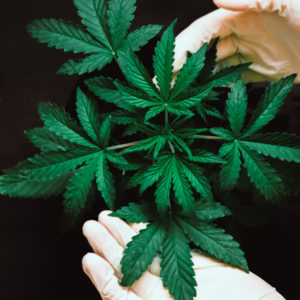If Republicans want to avoid losing control of the House — and possibly more — a few weeks from now, they will need more than just Republican votes. But how to get those critical votes to cross over without compromising critical principles?
Perhaps by touting a principled idea that crosses party lines: Glasnost with regard to the war on some drugs — particularly marijuana.
More than two-thirds of the states (both red and blue) have already decriminalized small-scale possession and use by adults; a majority of these have passed laws legalizing medical marijuana. And many have passed or on the verge of ending the failed — and very expensive — Pot Cold War entirely by approving recreational marijuana laws and treating pot the same as beer and alcohol.
Democrats have traditionally favored these policies, but a majority of GOP voters now do as well.
Especially GOP voters under the age of 60 who are the literal future of the party. These younger voters support more personal freedom — and less central control emanating from Washington. They feel much the same way about the war on pot as those on the left tend to feel about wars, generally.
But the point is that regardless of party affiliation, opposition to decriminalization is a loser at the ballot box. Which is why a story that bubbled up about a week ago about a furtive effort within the Trump White House to put the kibosh on pot Glasnost ought to be concerning to Republicans outside the White House who are running for election or hoping for re-election a few weeks from now.
Buzzfeed reporter Dominic Holden sussed out something called the Marijuana Policy Coordination Committee, which is busily working on data acquisition for a public-relations juggernaut whose goal is to convince the public that jump-starting the war on some drugs is a good idea.
According to Holden’s story, the Drug Enforcement Administration and no fewer than 14 federal agencies have been ordered to provide data that supports a hard-line anti-pot stance, such as “negative trends” associated with marijuana decriminalization and “threats” posed by marijuana as such — in order to buttress the committee’s belief that “prevailing (generally positive) marijuana narrative in the U.S. is one-sided, and inaccurate.”
Interestingly, says Holden, the committee is itself seeking only “one-sided” data — anything that can be used to portray marijuana in a negative light, regardless of what the data show.
The genesis of the committee is unknown — only that it exists and (presumably) exists because someone high-up conjured it into existence.
But who?
If President Trump authorized it, it goes against his many previous public statements — both on the campaign trail and after his 2016 victory — in favor of at least leaving it to the states to decide for themselves how best to handle the issue. He’s certainly never donned shield and magic helmet to go after individual marijuana users; in fact, he has repeatedly expressed sympathy for people who use marijuana for necessary medicinal reasons, such as pain abatement, glaucoma treatment and as an appetite stimulant (cancer patients).
It seems much more likely that the committee is the creature of Trump’s very-much-estranged (and very much out-of-touch) attorney general, Jeff Sessions, who is the real-life equivalent of General “Buck” Turgidson from the Cold War classic movie “Dr. Strangelove” when it comes to prosecuting the war on some drugs.
Sessions is clearly infuriated by state-by-state decriminalization; he has publicly threatened to prosecute marijuana “crimes” federally in states where there are no longer criminal statutes forbidding small-scale use and possession — using the federal Controlled Substances Act as his billy stick.
So far, the only thing that has kept Sessions on his leash is a funding rider that prohibits the use of DOJ funding for that purpose — something that infuriates Sessions all the more.
But Sessions’ obsession with the war on some drugs presents a real problem for the president and Republicans. Two-thirds of the country favors Pot Glasnost to one degree or another, and that includes more than four out of five Trump voters as well as an overwhelming majority of registered Democratic and independent voters.
There seems to be bipartisan agreement that — at the very least — arresting and caging people who’ve not actually harmed anyone else merely for possessing or using marijuana makes about as much sense as arresting and caging people merely for buying and drinking beer.
It’s an issue Republicans can ride to victory in November if only by not alienating Democrats and independents who might otherwise be persuaded to support them.

